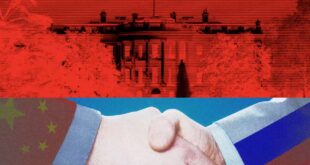Trump and his allies like Peter Thiel, who famously destroyed Gawker Media by secretly funding a lawsuit against it, have demonstrated a willingness to use the legal system against journalists. Earlier this month, Trump himself sued CBS for $10 billion, claiming that an interview with Vice President Kamala Harris constituted unlawful election interference. (While legal experts universally dismiss the suit as absurd, the network will still have to dedicate significant time and resources to defending against it.) And he has vowed to use the Justice Department to investigate his political enemies once in office—a threat that naturally extends to news outlets that have angered him. In September, the former president, now president-elect, accused NBC News and “others” of treason in response to coverage of his criminal court cases, while adding that many news outlets would be “thoroughly scrutinized” once he again takes office.
“They are a true threat to Democracy and are, in fact, THE ENEMY OF THE PEOPLE!” Trump said.
In July, the Reporters Committee and 53 other news media and press rights organizations called on Senate leaders to advance the PRESS Act, warning that the Justice Department’s rules could be changed or reversed on a whim. “Only Congress,” they said, “can provide the press the certainty of a federal statute.”
Senate staffers, who spoke on condition of anonymity, told WIRED that the bill’s inclusive “journalism” definition was a selling point among conservatives, with the definition extending well beyond the “institutional press,” as the courts sometimes call it. The language of the act defines a journalist as “a person who regularly gathers, prepares, collects, photographs, records, writes, edits, reports, investigates, or publishes news or information that concerns local, national, or international events or other matters of public interest for dissemination to the public.” This is in keeping with US traditions, rooted in the First Amendment, of defining a journalist as someone who practices journalism rather than as someone who belongs to a guild or operates under a government license.
“It’s a very broad definition,” adds Timm. “And there is no ideological test. It protects conservative journalists as much as it does liberal or mainstream or corporate journalists.”
“There’s nothing more commonsense, or more bipartisan, than shielding journalists from unnecessary government surveillance,” Senator Ron Wyden, who authored the Senate version of the PRESS Act, tells WIRED. “Conservative, liberal, and nonpartisan media all depend on speaking to sources without fear of being spied on by government officials who want to suppress unflattering information.”
Senator Tom Cotton, who previously voiced opposition to the bill, did not respond to a request for comment. In a statement two years ago, Cotton, a Republican from Arkansas, said the bill would “open a floodgate of leaks damaging to law enforcement and our nation’s security.” He went on to decry the publication of the Pentagon Papers—a classified study that revealed the US government had misled the public for decades over its involvement in Vietnam, which was published in full only after being read into the Congressional Record by then-senator Mike Gravel.
“These leaks were reckless and harmful to our national security,” added Cotton, declaring there are “no shortage of legitimate and legal avenues for whistleblowers to unveil potential government misconduct.”
Source link
 meganwoolsey Home
meganwoolsey Home



